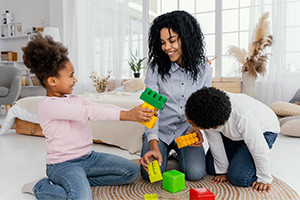Play is a fundamental right for every child, and it is very essential for their well-being. During play, children realise the separateness of "me" and "not me" and start to develop a working relationship with the world beyond "self." Play therapy is a way of helping troubled children cope with distress, and it is a medium of communication between a child and the therapist. The method is based on the central assumption that the act of play can be used as a therapeutic measure to relieve anxiety, anger, distress, and frustration in children.
This free psychology course will teach you how to use play as a therapeutic method to address the challenges of homeless children, children from broken homes, and children suffering from abuse or domestic violence. It begins with the origin and development of play therapy. You will learn about types of imaginative play, how to become a play therapist, and the guidelines for play therapists in the UK. Next, we consider the advantages and outcomes of play therapy and different models of play therapy. The section highlights three models of play therapy and social constructivism theory.
The last section explains how to initiate play therapy in children and the challenges of using play as a therapeutic method. We outline the strategies for intervention for sexually and emotionally abused children, as well as the basic requirements for healthy development in children. Finally, we identify the therapeutic procedure for homeless children and play interventions for mental health management in all children. Enrol now.
What You Will Learn In This Free Course
View All Learning Outcomes View Less All Alison courses are free to enrol, study, and complete. To successfully complete this Certificate course and become an Alison Graduate, you need to achieve 80% or higher in each course assessment.
Once you have completed this Certificate course, you have the option to acquire an official Certificate, which is a great way to share your achievement with the world.
Your Alison certificate is:
- Ideal for sharing with potential employers.
- Great for your CV, professional social media profiles, and job applications.
- An indication of your commitment to continuously learn, upskill, and achieve high results.
- An incentive for you to continue empowering yourself through lifelong learning.
Alison offers 2 types of Certificate for completed Certificate courses:
- Digital Certificate: a downloadable Certificate in PDF format immediately available to you when you complete your purchase.
- Physical Certificate: a physical version of your officially branded and security-marked Certificate
All Certificate are available to purchase through the Alison Shop. For more information on purchasing Alison Certificate, please visit our FAQs. If you decide not to purchase your Alison Certificate, you can still demonstrate your achievement by sharing your Learner Record or Learner Achievement Verification, both of which are accessible from your Account Settings.












 Avg. Hours
Avg. Hours  Contains Video
Contains Video  CPD Accredited
CPD Accredited 
 Total XP:
Total XP: 
 Knowledge & Skills You Will Learn
Knowledge & Skills You Will Learn 







